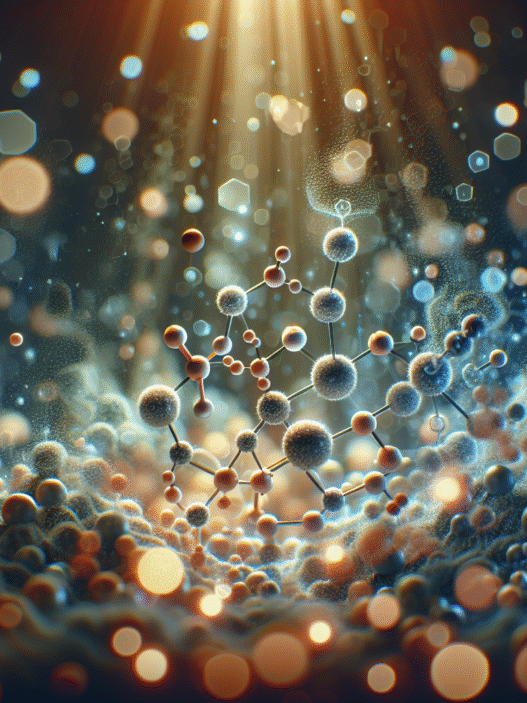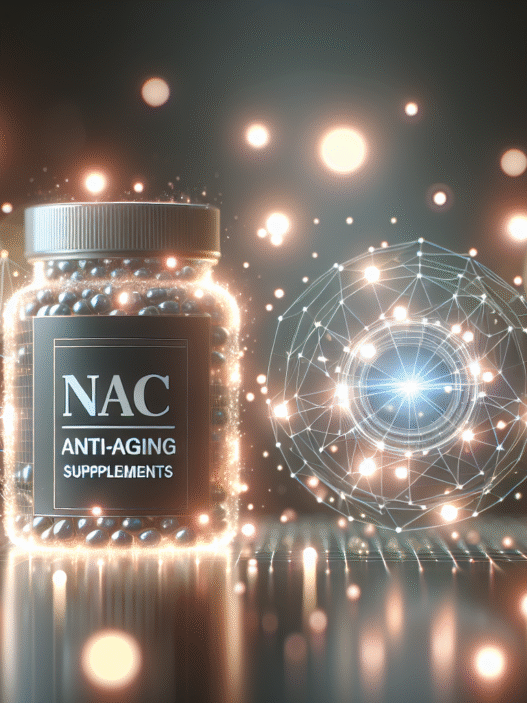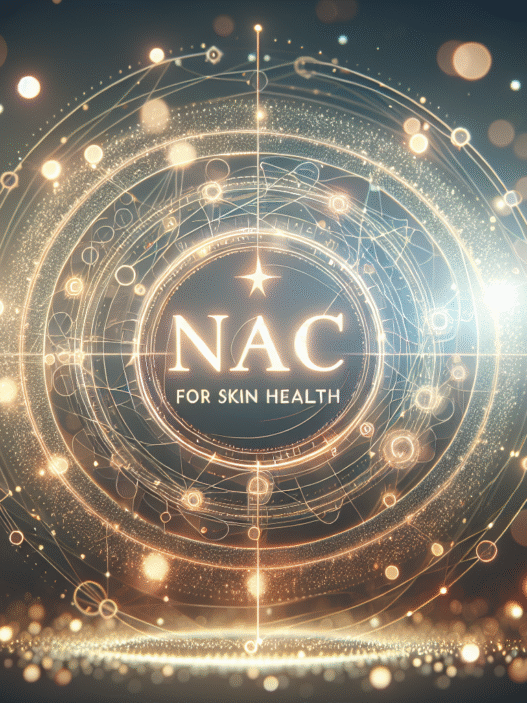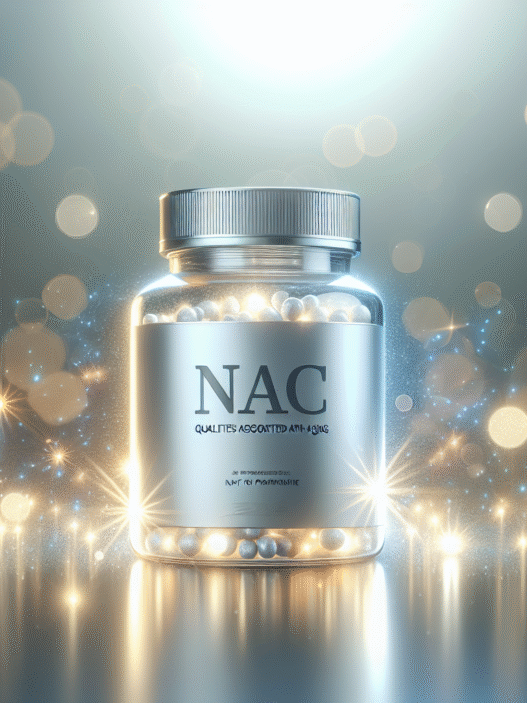Understanding N-Acetyl Cysteine (NAC)
An Overview of NAC
N-acetylcysteine (NAC) is a powerful supplement derived from the amino acid cysteine. It plays a vital role in health by increasing levels of glutathione, a key antioxidant. This antioxidant is essential for neutralizing free radicals, which are harmful molecules that can cause cellular damage. High levels of oxidative stress due to these free radicals can lead to various health conditions, including heart disease, diabetes, and infertility (WebMD).
NAC has a broad array of applications, particularly in promoting liver health and detoxification. It has also gained attention in skincare for its potential benefits in enhancing skin health and combating the visible signs of aging. Those seeking longevity and support in detoxification often turn to NAC as part of their health regimen.
Role of NAC in Antioxidant Production
One of the primary functions of NAC is its significant contribution to antioxidant production. It aids in the synthesis and replenishment of glutathione, which is crucial for combating oxidative stress. This process, in turn, can help reduce the risk of chronic diseases.
| Function | Description |
|---|---|
| Antioxidant Production | Neuroscience of oxidative stress and glutathione levels |
| Disease Risk Reduction | Mitigating cardiovascular disease and other chronic conditions |
Research continues to support the effectiveness of antioxidants in promoting overall health. By reducing oxidative stress, NAC may have beneficial implications for various aspects of health, including skin rejuvenation, which may interest those focused on n-acetyl cysteine skin care.
The antioxidant properties of NAC also make it a compelling option for those seeking to improve not just liver function but also the appearance and health of their skin. For more information on its specific benefits for skin health, visit our articles on n-acetyl cysteine benefits for skin and nac for skin health.
Health Benefits of NAC
N-Acetyl Cysteine (NAC) is gaining recognition for its numerous health benefits. This section discusses how NAC contributes to liver health, mental health management, respiratory conditions, and brain health.
NAC for Liver Health
NAC plays a vital role in detoxification and is especially known for its effectiveness in preventing liver damage. It is commonly administered intravenously for acetaminophen overdoses to mitigate organ damage. Studies have shown that NAC has potential applications in treating other liver diseases due to its powerful antioxidant and anti-inflammatory properties.
| Benefit | NAC Function |
|---|---|
| Detoxification | Helps in detoxifying harmful substances |
| Liver protection | Reduces toxicity and inflammation |
| Administration in overdose | IV use to prevent liver damage in acetaminophen overdose |
For more information about the broader benefits of NAC, see our article on n-acetyl cysteine benefits.
NAC in Mental Health Management
NAC has shown promise in managing various mental health conditions, including bipolar disorder, schizophrenia, obsessive-compulsive disorder (OCD), and substance use disorders. It does this by regulating glutamate levels and replenishing glutathione, a crucial antioxidant in the brain. Preliminary research suggests that NAC can help reduce cravings associated with cannabis and nicotine.
| Condition | Potential NAC Benefit |
|---|---|
| Bipolar disorder | Regulates mood and reduces episodes |
| OCD | Alleviates symptoms |
| Substance use disorders | Reduces cravings |
NAC for Respiratory Conditions
In respiratory health, NAC acts as both an antioxidant and expectorant. It helps improve lung function by replenishing glutathione levels, which reduces inflammation and breaks up mucus. This may be particularly beneficial for individuals with chronic obstructive pulmonary disease (COPD) and bronchitis. Studies indicate that NAC can improve symptoms and decrease the occurrence of exacerbations.
| Respiratory Condition | NAC Function |
|---|---|
| COPD | Improves lung function |
| Bronchitis | Reduces mucus and inflammation |
NAC and Brain Health
For brain health, NAC helps regulate glutamate levels and mitigate oxidative damage. This mechanism suggests that it could be beneficial in conditions such as Alzheimer’s and Parkinson’s disease. Additionally, NAC may improve fertility in both men and women, making it a promising compound for various health issues (Healthline).
| Brain Condition | Potential NAC Benefit |
|---|---|
| Alzheimer’s disease | May slow cognitive decline |
| Parkinson’s disease | Reduces oxidative stress |
| Fertility | Enhances reproductive health |
In summary, the multifaceted benefits of N-Acetyl Cysteine make it a valuable supplement for those concerned about liver health, mental well-being, respiratory issues, and cognitive function. For additional insights on NAC’s role in skin care and anti-aging, explore our resources on n-acetyl cysteine for skin and nac for anti-aging.
N-Acetyl Cysteine in Medical Uses
N-acetyl cysteine (NAC) serves various purposes in medicine, demonstrating noteworthy effects in areas such as acetaminophen overdose treatment, skincare applications, and fertility potential.
Usage in Acetaminophen Overdose
NAC is clinically recognized for its role in addressing acetaminophen overdose. When taken promptly—ideally within eight to ten hours—NAC assists in replenishing glutathione levels in the liver, facilitating the breakdown of acetaminophen and helping to avert potentially serious liver or kidney damage. This timely intervention is critical to improving patient outcomes following overdose incidents.
Applications in Skin Care
NAC has gained traction in dermatology, particularly for its skincare applications. Research indicates that topical formulations containing NAC can be effective in treating acne vulgaris. A double-blind, randomized trial involving 99 patients demonstrated that topical NAC significantly decreased comedone counts compared to a placebo group.
Moreover, NAC’s antimicrobial properties extend to its effectiveness against biofilms of diverse bacteria, which plays a vital role in maintaining skin health. With certain concentrations of NAC shown to diminish biofilm growth by over 50%, it supports the skin in fighting infections and promoting healing. For those interested in enhancing skin vitality and resilience, NAC proves to be a powerful ingredient.
NAC’s Potential in Fertility
Emerging studies suggest that NAC may have positive implications for fertility, particularly in women dealing with polycystic ovary syndrome (PCOS). By enhancing insulin sensitivity, NAC may contribute to improved hormone levels and menstrual regularity, ultimately benefiting fertility.
When considering N-acetyl cysteine, its benefits extend beyond traditional uses into the realms of skincare and reproductive health accordingly. For further insights, explore our articles on n-acetyl cysteine benefits and n-acetyl cysteine for skin.
Safety and Precautions of NAC
Understanding the safety and potential side effects of N-Acetyl Cysteine (NAC) is crucial for anyone considering its use, particularly in contexts such as n-acetyl cysteine skin care.
Interactions and Risks
Although NAC is generally considered safe for most people, there are certain interactions and risks associated with its use. One notable concern is its potential effect on blood pressure. NAC may lower blood pressure, and using it in combination with other medications designed to decrease blood pressure could result in excessively low blood pressure levels. Individuals should monitor their blood pressure closely if taking NAC alongside such medications.
Additionally, it’s essential to consult a healthcare provider before starting NAC, especially for those with underlying medical conditions or who are pregnant or breastfeeding. Potential side effects may include gastrointestinal disturbances like nausea and diarrhea.
NAC in Insulin Sensitivity
NAC has shown promise in improving insulin sensitivity, particularly in women with polycystic ovary syndrome (PCOS). Studies suggest that NAC supplementation may enhance insulin sensitivity, which can be beneficial for weight management and metabolic health in this population.
For individuals interested in leveraging NAC for its benefits in managing insulin levels or related conditions, the dosage of NAC is a crucial aspect to consider. Referencing reliable sources for recommended n-acetyl cysteine dosage will help ensure both efficacy and safety.
In summary, while NAC presents various health benefits, including those related to skin health, it’s essential to be aware of its interactions and potential effects on insulin sensitivity. For a more comprehensive understanding of its skin-related benefits, individuals can explore our articles on n-acetyl cysteine benefits for skin and nac supplement for skin health.
NAC in Dermatologic Conditions
In recent years, N-acetyl cysteine (NAC) has gained attention for its potential benefits in the realm of dermatology. Through various mechanisms, NAC can influence skin health, making it a noteworthy ingredient in skincare formulations.
Impact on Skin Disorders
NAC has demonstrated efficacy in treating several skin disorders. Research has shown that it can be effective against conditions like acne vulgaris, lamellar ichthyosis, bullous morphea, ulcers in scleroderma, and dermatitis. Its antioxidant properties contribute to improved healing and skin resilience (NCBI). In wound healing studies, NAC has increased angiogenesis and fibrosis, improving wound-breaking strength, indicating its capacity to enhance recovery in various skin conditions (PubMed Central).
Moreover, NAC has been reported to provide protective effects against radiation-induced dermatitis in animal studies, further suggesting its role in skin protection and repair. This positions NAC as a potentially powerful component in the treatment of both acute and chronic skin disorders.
Topical Application in Skincare
The topical application of NAC in skincare has been gaining traction due to its multifaceted benefits. A 5% NAC formulation has shown superior results in reducing comedone counts in patients with mild-to-moderate acne vulgaris (NCBI). By promoting the production of glutathione, a crucial antioxidant, NAC helps to strengthen and reinforce the skin’s protective and regenerative abilities. This leads to a smoother, better-hydrated, and more even complexion (City Skin Clinic).
In addition to treating existing skin conditions, NAC can also serve as a preventive measure against skin damage. Its antioxidant effects help combat oxidative stress, a significant contributor to skin aging. As a result, NAC is positioned not just for therapeutic uses but also for overall skin health and longevity.
Given the growing body of evidence supporting NAC’s beneficial effects on skin, it is being increasingly recognized as a promising ingredient in the formulation of anti-aging and restorative skincare products. For more information on how NAC can contribute to skin rejuvenation, refer to our article on n-acetyl cysteine skin benefits.
Future Potential of NAC
NAC Research and Development
N-acetyl cysteine (NAC) is blossoming into a subject of extensive research across multiple health sectors. Its roles in neurology, pulmonology, cancer treatment, vascular disorders, and psychiatry exemplify its broad potential. NAC acts primarily through its antioxidant capabilities, replenishing glutathione levels, which are crucial for maintaining cellular functions and combating oxidative stress. The compound has shown efficacy in reducing inflammatory cytokines, making it a candidate for treating various inflammatory conditions.
Prospects in Various Health Fields
NAC’s potential extends to several fields, particularly concerning its applications in skin care. Research indicates that NAC can benefit individuals with various skin disorders, such as acne vulgaris, lamellar ichthyosis, and dermatitis (NCBI). These effects are attributed to NAC’s ability to scavenge reactive oxygen species, thereby enhancing skin health and possibly contributing to its anti-aging properties.
Additionally, insights into NAC may provide a foundation for its incorporation into skin care formulations. The compound’s anti-aging properties can promote skin rejuvenation, making it a valuable component in n-acetyl cysteine skin care.
As researchers continue to investigate NAC’s multifaceted benefits, it is poised to become a staple in anti-aging regimens and skin revitalization efforts. The future potential of NAC in health ranks it among the most promising compounds for those seeking longevity and improved skin quality. Further studies could solidify NAC’s position not only in therapeutic settings but also in everyday skin care practices, enhancing its accessibility to those interested in n-acetyl cysteine benefits for skin.





















